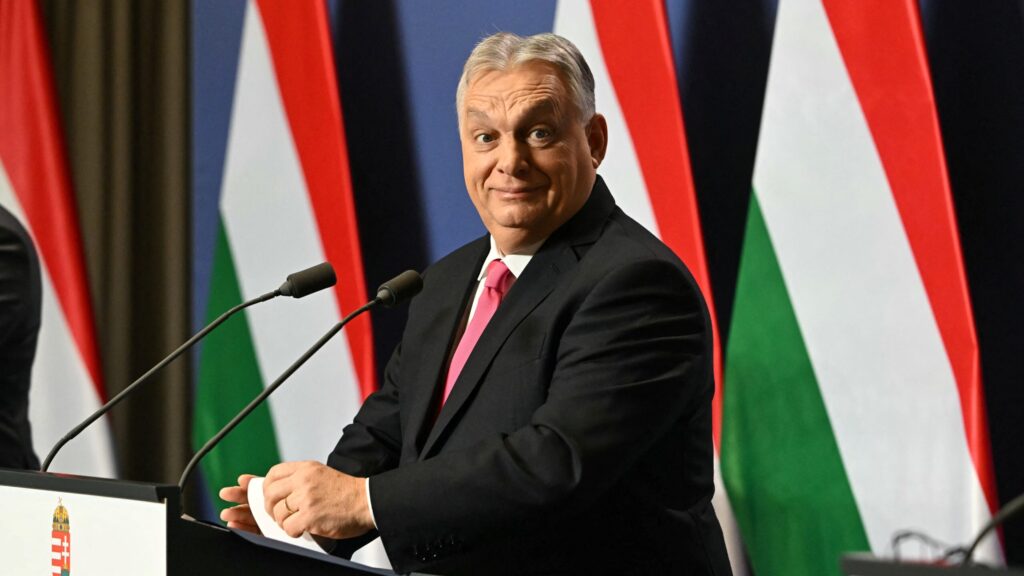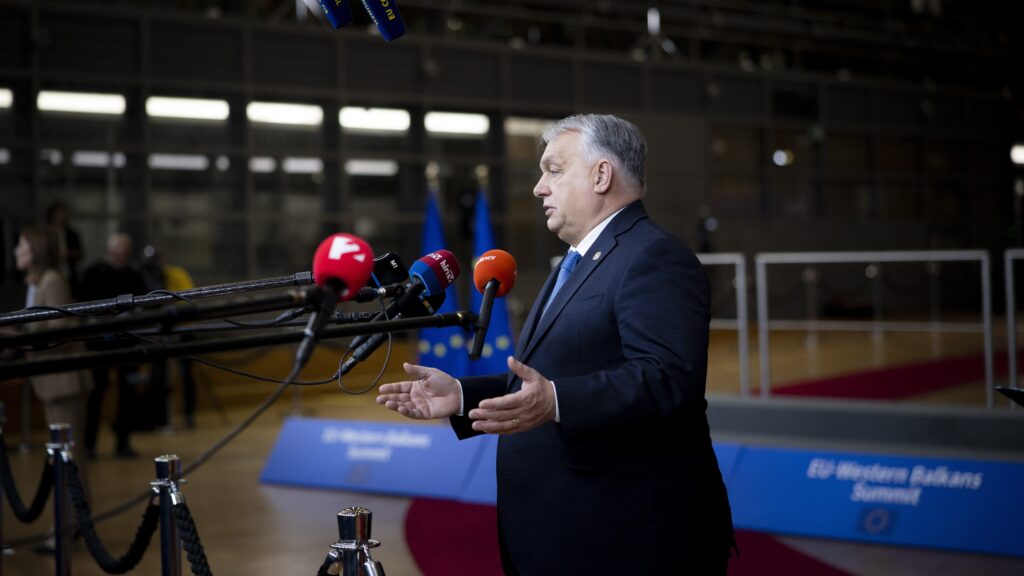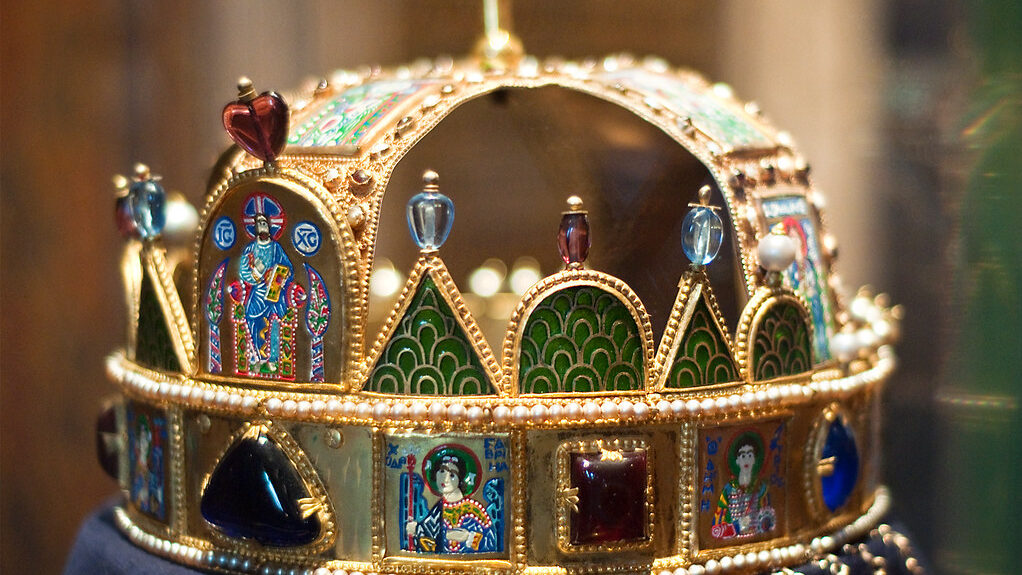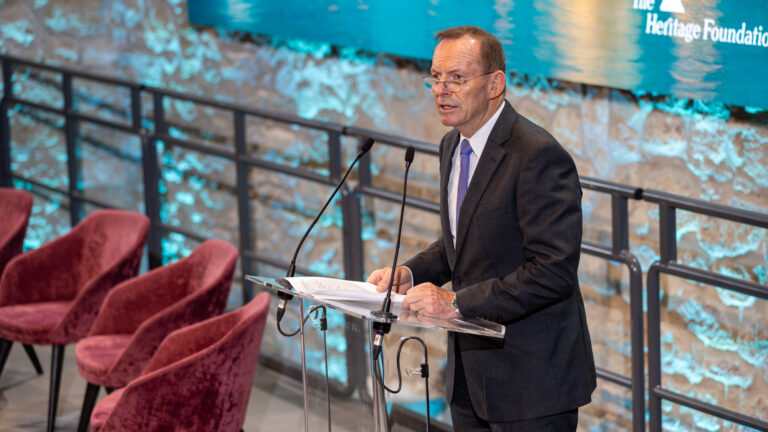The Hungarians, and even the Poles, have already set an example for the West that a strong majority can be achieved in a parliamentary election by standing up for real conservative values. However, this requires us to be able to manage the diversity within our own camp—and this would be necessary among the conservatives in the European Parliament as well, Professor Ferenc Hörcher, Director of the Research Institute of Politics and Government at Ludovika University of Public Service, opined in an interview with Hungarian Conservative. At the joint conference of the Danube Institute and the National University of Public Service, we also asked the political philosopher for his thoughts on the upcoming British elections.
***
At the recent conference titled Free Speech and Freedom of Thought: British and European Conservative Visions of the Future of Europe at the Danube Institute, there was much discussion about European values. What are these values exactly? Is it still possible to preserve them?
As a European grandfather living in Europe with my family, including children and grandchildren, I hope that Europe can preserve such traditional values as the family. To do so, we, Christians have our responsibility. At the conference held at the Danube Institute, the focus of my presentation was precisely on what contribution Christians can make to saving European values. Saint John Paul II and Benedict XVI drew attention to the fact that when we think about the future of Europe, we should build on the Christian tradition that has worked well for 2,000 years and, additionally, was also able to respond to changes. According to their argument, we should not ignore this tradition, as was done in the European constitutional debate, where European Christian traditions were put aside.
Instead, we should adapt them to the new circumstances while preserving the core moral values. Let’s say the protection of human life, the protection of the family, or the protection of the sort of education that characterized Europe are basic values that we should definitely stick to, because otherwise we are not Europeans. Of course, we should be ready to confess our wrongdoings, as did John Paul II, apologizing for the sins of the church. But if our communities are ready to admit their sins, then they should also be proud of their achievements—and all in all, we should preserve our identity.
Can we talk about uniform European values at all? Europe is diverse.
We are in the middle of a cultural war, which has already reached Hungary but is present much more intensively as we move towards Western Europe, especially in the Anglo-Saxon world. I think that the maxim of the founders, supported by the Church, ‘unity in diversity’, helps here.
The important thing is not to homogenize our communities and cultures, but to preserve their original parti-coloured nature
in interaction with each other and to be able to learn from each other’s diversity.
Either from each other’s mistakes or from each other’s merits, from good practices and from the wrongdoings that we ourselves commit. Setting aside our values or overlooking our mistakes to impose a uniform belief system is not a sustainable approach. Preserving Europe’s cultural diversity, including religious and Enlightenment traditions, is essential for sustainability.
The European Parliament elections were held recently, which ended with the strengthening of the conservatives. What do you expect?
In the aftermath of the election, there was a potential opportunity for cooperation between the European People’s Party, which secured the most seats, and the more radical or traditional conservative forces. However, according to press reports, this cooperation is unlikely to occur. In the political culture of the European Parliament, numbers determine compromises, and the strengthened conservatives seem to dictate what is going to happen. They seem to keep their coalition intact with the left and the liberals. The EPP remains a commanding force, yet it may not be able to take certain actions without the support of the strengthened conservative representation, such as the European Reformers and Conservatives (ECR). Furthermore, if there is a significant shift in the early elections in France and Marine Le Pen’s party emerges victorious, further changes are possible.

While the left-liberal representatives are characterized by close cooperation in the European Parliament, there have always been and still are frictions between the conservatives. Will they learn to cooperate this time?
The tension lies in the fact that the right-wing parties and conservatives generally represent their diverse national and historical values. For this reason, it is inherently much easier to align values on the global left. In addition, the conservatives are spoiled because the European People’s Party has always been a dominant force in European politics, in the European Parliament, and now they have won again. As winners, they want, for example, the president’s seat of the European Commission, which is the most important position in the EU—the head of the ‘executive’ power. However, you are also right that the left has been practicing the art of compromise within its own parties for much longer. They do not want to cooperate with real conservatives, but they found partners within their own leftist-liberalist communities and the centrist EPP. On the other hand, the conservatives, for whom principles matter, find it more difficult to establish practical compromises.
If conservatives really want to kick the ball, then the tensions between them should be put in brackets.
Let’s say the war against Ukraine and the enforcement of Russian influence is one such issue, the refusal of illegal migration a further one. All these can obviously be legitimate concerns or legitimate objections, but if the conservative forces do not cooperate, then the principle of ‘divide and rule’ will still prevail. The European People’s Party will cooperate with the left as always. And the right has to learn from its own mistakes. By the way, in this regard, the Hungarians and the Poles, as well as Meloni, have already shown an example that we rarely see in the West, that a strong majority in a parliamentary election can also be achieved by standing up for real conservative values. However, this requires us to be able to manage the diversity within our own camp. This would be necessary among the conservatives in the European Parliament as well. Undeniably, it is a much more disjointed environment, so it is more difficult for a cooperation to prevail. Giorgia Meloni can play a key role there. An Italian colleague of mine, who, by the way, has a close look at the decision-making processes of the Italian government, said that Meloni’ s cards are not yet all out. There is still, therefore, a chance for such a practical compromise, where no one has to make too great a sacrifice, but still, the right-wing influence can strengthen compared to the fact that until now, left-liberal dominance and monopoly really prevailed.
Parliamentary elections are approaching in the United Kingdom. The Conservative Party’s popularity is at a historic low, raising concerns about the party’s future. Where are the Tories heading?
According to some well-informed British colleagues, the Conservative Party is on the verge of a significant defeat. However, this is not due to their conservatism but rather their lack thereof. According to much of its electorate, the party needs to rediscover its conservative roots in order to revive itself. While there is much speculation about Nigel Farage’s new party, dismantling the established Conservative Party would not be an easy task. It is crucial for those who genuinely value the long-standing conservative principles of the Tory tradition to assume leadership roles and steer the party back to its roots. If this happens, that is, the intellectual work is carried out, for instance, like at our recent conference, it could have a positive impact. This type of intellectual reloading and revival of original values is crucial for a political party to shape its self-image, self-awareness, and self-esteem, as well as to gauge its fidelity to its own identity. This could be critical for the survival of the Tories.
Read more interviews:







